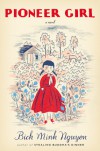11
Following
Tales Between the Pages
A Reader's Guide to Authors and Books
www.talesbetweenthepages.com
Currently reading
The Princess Bride: S. Morgenstern's Classic Tale of True Love and High Adventure: The "Good Parts" Version, Abridged
The Girl Who Chased the Moon
Progress:
33 %
Pioneer Girl
A Clash of Kings
SPOILER ALERT!
The Friday Night Knitting Club (Friday Night Knitting Club Novels)
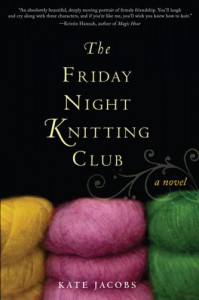 This is my very first fiction DNF. It took me forever to read the first half of the book. It was just ok. I wasn't in love with the characters or their stories. I thought Georgia's daughter was annoying. I hated that no one had a healthy relationship with men. Race was also handled in an awkward way.
This is my very first fiction DNF. It took me forever to read the first half of the book. It was just ok. I wasn't in love with the characters or their stories. I thought Georgia's daughter was annoying. I hated that no one had a healthy relationship with men. Race was also handled in an awkward way. I have this terrible habit of reading the last few pages of a book when I'm in the middle. I like spoilers sometimes. When it happened with this book, I found out that Georgia dies.
Let me explain something, I generally pretend death doesn't exist in my own life. For some reason, I've been thinking about it a lot lately. Now I can't bring myself to finish the book. Honestly, I'm not that broken up by it. If the last 1/2 of the book was STELLAR, I might only give it 3 stars. As it stands, with half of the book read, I only give it two.
I've read plenty of other books lately where a character dies. I seem to be fine with those. I'm not sure why this particular book and this particular death scene bugs me so much.
Columbus Avenue Boys: Avenging the Scalamarri Massacre
 I was hesitant to pick up this book because I'm not always interested in crime family novels. The last book that I read that tried to be a crime family novel was Promise Me Eternity by Ian Fox. We all know how much I liked that book ...
I was hesitant to pick up this book because I'm not always interested in crime family novels. The last book that I read that tried to be a crime family novel was Promise Me Eternity by Ian Fox. We all know how much I liked that book ...But, I'm glad that I read Columbus Avenue Boys by David Carraturo. The characters were completely engaging. I found myself charmed by their quirks and personalities. I especially love Vincent's story and the dynamic between Tony and Sal.
My only wish was that it was about three times as long. This is one of those books that would benefit from being 700+ pages. Family sagas, in my opinion, need to be that long in order for readers to savor each generation's story line. If it were mine to do over again (and it's not, I know), I would have chosen to really devote time to the flashback moments in the book. Those were the parts that I loved the most and were the least well done. As I was reading, I said multiple times, "Show me! Don't tell me!" especially during Vincent's time in the military and his time driving for a crime member as he plots Bugsy Siegel's murder. As much as I thought Tony and Sal were funny guys, it was hard for me to really invest myself in their story because I didn't have a really solid foundation of their family history.
I wanted to dislike the book because the author kept telling me things he should have shown me. But there's just something about this family and these characters that kept me coming back for me. I NEEDED to know what happened. I NEEDED to know whether Tony and Sal's cover would be blown. I NEEDED to know if their revenge was carried through.
I recommend Columbus Avenue Boys by David Carraturo for those of you who enjoy reading crime family novels. I think you'll be charmed by the Scalamarri family. I know I was. Though it may not be as detailed as it should be, I still think Carraturo tells a great story that deserves to be read.
Lake in the Clouds
 To be honest, I didn't enjoy Lake in the Clouds by Sara Donati as much as I enjoyed Into the Wilderness and Dawn on a Distant Shore, the first two books in the series. Don't get me wrong, I still thought it was an enjoyable read. I liked it a lot, in fact. Ultimately, though, Donati experiences some growing pains writing this series. Lake in the Clouds is very much a transitional novel, switching from Elizabeth and Nathaniel's primary POV to Hannah and Lilly's POV. From what I can tell, this is because these two characters play a more important role in the later series.
To be honest, I didn't enjoy Lake in the Clouds by Sara Donati as much as I enjoyed Into the Wilderness and Dawn on a Distant Shore, the first two books in the series. Don't get me wrong, I still thought it was an enjoyable read. I liked it a lot, in fact. Ultimately, though, Donati experiences some growing pains writing this series. Lake in the Clouds is very much a transitional novel, switching from Elizabeth and Nathaniel's primary POV to Hannah and Lilly's POV. From what I can tell, this is because these two characters play a more important role in the later series.Despite the growing pains, I found a grown up Hannah quite refreshing. Her time in New York was utterly fascinating. Hannah is very much in her own head. She pays attention to the world around her, but not with the kind of detail that I thought she should have. Her diary entries, though fascinating, seemed a bit like a cop-out so Donati could move the plot along. Like I said before, transitional novel. A lot has to happen in this book and it's already about 700 pages long.
Once Hannah returns to Lake in the Clouds, the most fascinating thing happens: the pace slows down for the characters yet the narrative is rushed. She works with Dr. Richard Todd to vaccinate the town against smallpox. She helps fight a scarlet fever epidemic. She has to handle Jemima Southern (who I absolutely hate). During this time, Lilly starts to come into her own. Donati gives her more time than I think she should have. Lilly doesn't really DO anything to advance the plot other than learn to draw and predict who Hannah marries. This might irk me, but Lilly is such an interesting character. I can see why Donati chose to give her more page time. Apparently she's a big character in the next novel.
In any case, I still gave this book 4 stars because, according to my rating system, I "really liked it." I did really like it despite its growing pains. I think it's an exceedingly hard job to write an epic family series. Transitioning from one generation to the next can be quite difficult. Though Donati doesn't do it as well as some that I've read, she does do a good enough job to keep a reader interested.
The First Wives Club
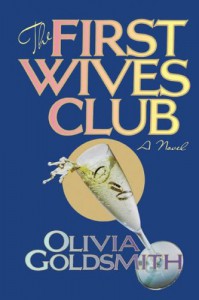 Read the full review at Tales Between the Pages
Read the full review at Tales Between the PagesThis book surprised me. I came into it having watched the movie, which was very light hearted. The first half of the book was quite a bit deeper than I expected. There were moments of beauty and heartache and despair. Annie's story resonated with me more than any of the other women, which surprised me. Her emotions felt the most real to me. Her husband was the most despicable out of all of them (even the megalomanic/woman beater). Annie's husband only left her but refused to acknowledge their daughter with Down's Syndrome. AND he only really liked his first born son. The middle son was always neglected because he saw how special his sister is. OH. And he gambled away his daughter's trust fund on the stock market. That was the money that was supposed to sustain her lifestyle at a special school. Annie had to sell everything she owned in order to make sure her daughter would have a happy, healthy, and normal life at Sylvan Glades. Despite all that, I think it was Annie's loneliness really resonated with me. I've been that lonely before so I could relate to her on a very deep emotional level. Annie's character is so much deeper than the Diana Keaton portrayal of her in the movie.
Right around the 50% mark in the book, Olivia Goldsmith changed her writing style. The chapters shifted from these detailed character moments that were really introspective to these choppy chapters that jumped around. You know what I'm talking about when I say choppy chapters -- the kind of chapters that jump POV's and are separated by a few line spaces and a ***. I might not have had a problem with this if she hadn't just decided to start doing it in the middle of the novel. To be honest, I didn't care what the minor society characters were thinking/talking about. I was invested in and cared about the main characters. To have moments without them showed me that Goldsmith lost her way a little bit toward the end. It seems like she felt compelled to include ALL THE THINGS rather than the most important. My little gripes here are what kept me from giving this a four star review.
However, I found The First Wives Club by Olivia Goldsmith to be the precursor to what we think of as chick lit. I read a review on Goodreads that called the book "the grandmother of chick lit." I think that's an apt description. This was published before Carrie Bradshaw and Bridget Jones hit the scene. I can't say that Goldsmith intended on creating a new genre that's marketed to women but I think she and the book are probably as close as we can get to that moment where authors and publishers realized that female readers were their most powerful demographic.
All in all, the book was DEFINITELY better than the movie and quite an enjoyable read. If you've ever been scorned and/or lonely, you'll be able to identify with Elise, Brenda, and Annie.
Handbags and Homicide (Haley Randolph Mysteries)
 You can see this review at Tales Between the Pages
You can see this review at Tales Between the PagesHandbags and Homicide by Dorothy Howell is a fun read that is perfect for summer. It’s funny, fast-paced, and there are enough designer handbag references to make you drool. I’m not a handbag afficionado. I buy cheap at Target. But the book even had me drooling when I looked up pictures of the handbags in question.
I had a hard time liking Haley at the beginning of the novel. I found her vapid and narcissistic and not too like-able. For a while, I wasn’t sure if I was going to like the novel at all. I mean, she finds a dead body and it’s not big deal? Why isn’t it a big deal? Dead body. Pool of blood. BIG DEAL! But, something shifted for me around the time she figured out she was being accused of embezzlement. She had this moment of “How could I have been so stupid?” and vowed to never let it happen again. That moment of self-realization shifted me from “I always finish books, no matter what” to “What’s going to happen next? I HAVE TO KEEP READING!” At that moment, she became real to me.
My advice to you: keep reading. It gets better.
I think Handbags and Homicide by Dorothy Howell is equal parts Confessions of a Shopaholic and Janet Evanovich/Stephanie Plum novels. I noticed a few similarities in the dynamics between Haley/Ty/Jack and Stephanie/Joe/Ranger. It’s not an exact replica, Hayley and Jack’s flirtation is very similar to the flirtation between Stephanie and Ranger. I think if you’re fans of both series, you’ll enjoy Handbags and Homicide.
The Inheritance - Book Club Edition
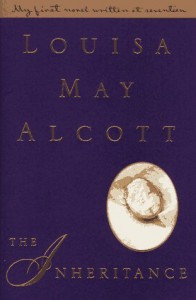 Read the official review at Tales Between the Pages
Read the official review at Tales Between the PagesThis is Louisa May Alcott’s very first book, written 20 years before Little Women. it reminds me a lot of Jane Austen’s first novella, Love and Friendship. I think Alcott was very much influenced by the sentimental genre because The Inheritance is very much a sentimental kind of text.
What is the sentimental genre, you ask? It’s a genre of novel very popular in the eighteenth century that focuses on sentiment and sensibility. It often focuses on the “underdog” characters, mostly orphans. Oh my, the orphans. I’ve come across some that focus on criminal but the orphan is by far the most popular, especially in English sentimental texts. American sentimental literature focuses a lot (and I mean A LOT) on seduction. Susanna Rowson’s novel, Charlotte Temple (1792) is perhaps the most famous sentimental novel about seduction. Hannah Webster Foster’s The Coquette is a close second. The sentimental genre evolved into “domestic fiction” and the conduct novel in the nineteenth century. Conduct novels were often meant for young women to read because people feared novels in general. They were afraid women reading seduction novels would succumb to seduction themselves. Conduct novels helped rally the rise of the novel because they attempted to debunk that myth. Women could and often did read without running off with the first rake who nodded in their general direction. Fiction could teach as well as entertain.
I’ve seen a few one and two star reviews of this book calling it garbage. I think if we can recognize that Alcott is imitating a very specific and very popular genre for the time-period, the text itself becomes a bit better and more important considering how prolific her writing career became.
With that being said, the story was surprisingly well crafted for being Alcott’s first foray into fiction. It’s about a wealthy family who takes in an Italian orphan named Edith, who grows up with the family and is young Amy’s companion and teacher. Edith is modest, sensible, smart, beautiful, and good-hearted. Cousin Ida hates her. When Lord Percy comes to visit the family and is instantly smitten by Edith’s charm and beauty. [Don't be alarmed or stop reading here. This is a convention of the genre]. Ida vows to bring Edith down. Why should Edith get all the attention when Ida is clearly higher born? Like the description says, a secret inheritance allows virtue to prevail. I think you can get the picture here.
I think I might have enjoyed this novel a little more than others because of my interest in the sentimental. Yes, there are “convenient” plot-points but that’s not the point. The real reason the sentimental is so important is because at the heart of each novel there is a message. Alcott’s message is about greed, wealth, and loyalty. A few of her characters are shells: Amy and her brother, most notably. Ida is a stereotype but the story does need a villain. I found that Edith and Lord Percy are the most “full” characters. They have deeper motivations and feelings than the others.
There is drama and romance and betrayal, but there is also a happy ending that solidifies Alcott’s message about greed, wealth, and loyalty. Greed never wins. A loyal friend is worth more than any amount of money. A person can be more wealthy than they seem. Though basic lessons, Alcott presents them well. Though The Inheritance by Louisa May Alcott is not her best work, it is, nonetheless, important when considering Alcott’s body of work. It may seem trivial that she started out in the sentimental genre, but I think it lays a great foundation for the rest of her writing career.
Bridget Jones's Diary
 You can read the whole review at Tales Between the Pages
You can read the whole review at Tales Between the PagesI came into this book having seen the movie. I still haven’t decided which is better. Does one have to be better than the other?
In any case, I really liked this book. I love that it’s set up as a diary, as well. Although, I will say that I often skipped the date headings … so sometimes I didn’t know what month I was in. I read some review on Goodreads that mentioned that it just didn’t seem realistic that she could keep a minute-by-minute diary as everything happened. I don’t think that’s what she did. I tend to think that Bridget wrote down everything toward the end of the evening. She could count her drinks/cigarettes/lottery tickets better that way.
What surprised me about Bridget Jones’s Diary by Helen Fielding is that there are quite a few feminist themes in it. Bridget’s friend Sharon calls the games men play: “fuckwittage” and tells them all that they’re better off without men who play “fuckwittage.”
The only thing that I didn’t like about the story is the Bridget’s mom/Julio fraud story line. I guess people get duped every day, but I’d like to think her mom was smarter than that. Still, it makes for a zany story.
Bridget may seem like a caricature because she has so many flaws, vices, and mishaps, but really Fielding is making her relate-able to almost every woman. We’ve obsessed about weight, men, smoking, our appearances, etc. for so long. Bridget embodies all of our insecurities. And you know what? It’s ok. She ends up happy. I think Fielding tells us, through Bridget, that we’re going to be ok, too.
An Irish Country Doctor
 What I loved the most about this novel is the way it slows time to a standstill, allowing you to focus on this one village in North Ireland and this one distinct time. I felt like I was looking through a portal into the past. I believe this was a point of contention for some people when I was reading reviews of the book. However, what they consider negative, I consider positive. I really felt like I got to know these characters. I found myself wanting to live in Ballybucklebo and take part in their distinct culture.
What I loved the most about this novel is the way it slows time to a standstill, allowing you to focus on this one village in North Ireland and this one distinct time. I felt like I was looking through a portal into the past. I believe this was a point of contention for some people when I was reading reviews of the book. However, what they consider negative, I consider positive. I really felt like I got to know these characters. I found myself wanting to live in Ballybucklebo and take part in their distinct culture.I’m not sure what kept me from giving this a five-star review. I did only “really like” this book instead of love it. Perhaps it’s because I was more attached to Fingal than I was to the main character, Barry. I found Barry’s character a little flat at the beginning. He’s unsure of the path he wants to take; he’s not sure he wants to have a career as a general practitioner in a small country village. The only thing he does know is that there will be no other Patricia. However, by the end of An Irish Country Doctor by Patrick Taylor, I found myself more attached to Barry. He removed that “by the book” stick out of his backside and really started to enjoy life in Ballybucklebo.
I think what I most loved about An Irish Country Doctor are the unique characters. I come across authors who try to create quirk but end up creating these caricatures of people who you can’t possibly think could exist in life. The beauty about Patrick Taylor is that he’s created these unique characters that are still believable. He’s pinpointed all the quirks of living in such a small town and folded them into characters like Kinky Kincaid, Seamus Galvin, and Fingal O’Reilly. They really jumped off the page and into my heart.
This is a great beach read if you’re looking for something lighthearted to read over the summer and/or on vacation. I think you’ll fall in love with Ballybucklebo just like I did. I highly recommend it.
 Read the full review at Tales Between the Pages
Read the full review at Tales Between the PagesI don't think Ian Fox likes women very much.
...
[T]here are two different kinds of female characters: the bitchy, controlling, greedy kind and the kind that blindly falls for the protagonist without explanation. In any case, all of these women are stereotypical. I couldn't find a single female character who I could identify with. This is a problem for me. An author should be able to write both genders well and not give preference to one or the other. I can usually overlook a few errors in this regard, but I made at least 20 notes in this book about how these women acted. They lied, they cheated, they nagged, they connived, they obsessed over money. I couldn't handle it. Women are so much more than all of these things. I couldn't even find a reason why he chose to portray them in this way. Sometimes books will satirize subjects or use stereotypes in a manner that makes for good social commentary. I couldn't find any of that in Promise Me Eternity. I truly believe this author thinks he was writing authentic characters.
...
There are really two stories here: the medical thriller and the character-driven story that tries to send a message. The thriller part isn't so bad. What really detracts from the story is all the extra characters who have story lines when they shouldn't. Anita, the neighbors, the corrupt cop, the Lawsons ... they all have SIGNIFICANT time in the book. Their stories contribute nothing to the main plot. The last 15% of the book was devoted to wrapping up the insignificant characters' plots rather than focusing on the main character and his story arc. I think Fox believes he wrote a character-driven story that focuses on greed. That would explain all the superfluous characters and their arbitrary stories. The book really would have benefited from a good editor and some resolve to cut.
Promise Me Eternity was pretty infuriating to read. Based on my Rating System, I do not recommend it. I just can't. The characters are stereotypical and the book is about 100 pages too long. In short, don't waste your time.
Dead End Deal
 Read the full review at Tales Between the Pages
Read the full review at Tales Between the PagesAllen Wyler crafts a solid thriller with Dead End Deal. What I appreciate is that he decided to play with the format of the genre. He experimented, took some risks, and ultimately succeeded. Instead of trying to figure out who the bad guy is , Weyler gives us the rare opportunity to be the kind of omniscient reader who knows all and sees all. We know who he is from the beginning. This format might be a problem for other thrillers. Sometimes a weak story needs that mystery to hold it together. I know from my own experience that figuring out “whodunit” is the only reason I’ll finish a book. With Dead End Deal, I wanted to finish because I was invested in the story.
There were a few gripe worthy moments, though. Wyler tends to add a lot of product placement to his story. I felt like brands were starting to take over (Droid, Kindle, etc.). I know we use these things on a daily basis, but ultimately I think it will date the story. Because technology evolves at such a rapid pace, just a short time from now someone will be reading this book and thinking “Wow, this guy is behind the times!” I think that creating a timeless story is really important. If Droid were replaced with cell phone or smart phone, readers in the future could picture what they want based on the most current technology.
....
BUT! Don’t let my little gripes get in the way of you enjoying Dead End Deal by Alan Wyler. It’s fast paced, you get to go to exotic locations (Korea, for example), and you get to learn a little bit about the relationship between bio-tech companies and those who conduct academic research. All in all, Dead End Deal is a winner.
The Car Thief
 Read the entire review at Tales Between the Pages
Read the entire review at Tales Between the PagesThe Car Thief by Theodore Weesner was first published in 1972 by Random House and has had a sporadic republishing history. It was republished in 1987 by Vintage and again in 2001 by Grove Press. It’s newest incarnation in eBook format by Astor + Blue will ensure this literary gem reaches the wide audience it deserves.
I’ve been reading early American literature for my PhD program and “fluff” for the first few weeks of summer so I wasn’t at all prepared for how literary this book was. That’s not to say that literary is a bad thing. It’s not. In fact, it’s quite refreshing to read a story so well-crafted and that gives such wonderful attention to language and detail. I’ll say that the first chapter came as a shock to my system. However, once the initial shock wore off, I was engrossed with the story. I was buckled in with Alex ready for him to take me on a joyride. What a ride it was.
Like any bildungsroman, The Car Thief is a coming of age story. However, unlike other notable bildungsromans like The Catcher in the Rye (which I hated) and The Perks of Being a Wallflower (which I loved), The Car Thief is poignant and beautiful and saddening all at the same time. There’s something to be said for simplicity, of simple words strung together in an honest way telling an honest story. There is something about The Catcher in the Rye and Perks of Being a Wallflower that seem a bit to contrived and even phony at points. Never once did I have that impression with The Car Thief. I think it reaffirmed my faith in the bildungsroman genre.
....
Overall, The Car Thief‘s poignancy and honesty make it a book for all to read. Though technically YA, The Car Thief is timeless and ageless, meant to reach a wide range of people. I think we all suffer from the pain and shame of life and can easily identify with Alex’s need to reconcile and move on.
The Alexandria Link: A Novel
 Read my full review at Tales Between the Pages
Read my full review at Tales Between the PagesI'm starting to think that Steve Berry is a megalomaniac. The more of his books that I read, the more I see his fascination with power and self-importance. I keep reading him because I expect his stories to get better. I like Cotton Malone, I really do. Thus, I go back.
With that being said, The Alexandria Link sounded promising. I've always been fascinated by its secrets. Is it still out there? Did any of it survive? However, what I realized about half way into the book is that it's just another one of Berry's attempts to destabilize religion. I normally wouldn't have a problem with this, but THREE out of the five books that I've read has tried to destabilize religion in some way, shape, or form. It's getting a bit old. I find myself saying, "Yeah, yeah, the Bible is flawed. We know that," a bit too much with his books
...
So what did I like, you ask? There were moments where I forgot about all of the things I'm griping about and truly enjoyed reading. I like Stephanie and Cassiopeia's story line. I'm a sucker for a government thriller. In fact, I'd would have rather like Berry to go that route instead of the path he did choose. I also liked the riddles and the quests. Seeing Cotton try and figure out the hero's quest was pretty interesting. I did think they solved it a bit too quick. There weren't enough real obstacles in his way ... just men with guns. They're easily taken care of.
Overall, the story is fun. It also gets you thinking. But, if you've read a lot of these "religion has secrets" novels like I have, you'll find The Alexandria Link formulaic and pretty unremarkable.
The Help
 I suddenly feel overwhelmed trying to write down a review that conveys the most important elements of this book. How can I possibly tell you how well it addresses racial tension in Mississippi, the hot-button state of the 1960s? My muscles seized up with worry when Aibileen was kicked off the bus and forced to walk home in the midst of a Klan killing. The tensed up every time Skeeter drove to the “other” side of town to meet with Aibileen to write. My breath was ragged in anticipation wanting to know when Hilly would reach the part of the book about her … and the ill-fated pie.
I suddenly feel overwhelmed trying to write down a review that conveys the most important elements of this book. How can I possibly tell you how well it addresses racial tension in Mississippi, the hot-button state of the 1960s? My muscles seized up with worry when Aibileen was kicked off the bus and forced to walk home in the midst of a Klan killing. The tensed up every time Skeeter drove to the “other” side of town to meet with Aibileen to write. My breath was ragged in anticipation wanting to know when Hilly would reach the part of the book about her … and the ill-fated pie.How can I tell you about the heart-warming moments, the laugh-out-loud moments, of a book that illuminates that women are women, no matter what their color? The genuine love between Aibileen and Mae Mobley? The friendship formed between Celia and Minny? The struggle of two white women and how their maids saved them?
Read the rest of my review on my blog, Tales Between the Pages
Boomtown (Originally The Vigilante) (Reno Western Saga #4)
 The plot of Boomtown is very similar to that of Reno. Bullies are controlling the town and scaring the miners off their claims. Only Reno can rally the troops to fight them. Ho-hum. It was really hard for me to finish this book. About halfway through I asked myself if taking the time to finish it was even worth it. But, I hate not finishing a book so I pushed through. The end was much better than the beginning so ultimately I was happy I finished it.
The plot of Boomtown is very similar to that of Reno. Bullies are controlling the town and scaring the miners off their claims. Only Reno can rally the troops to fight them. Ho-hum. It was really hard for me to finish this book. About halfway through I asked myself if taking the time to finish it was even worth it. But, I hate not finishing a book so I pushed through. The end was much better than the beginning so ultimately I was happy I finished it.Lee and Dooley are back in Boomtown. I was pleasantly surprised that they made it to another book. That’s a plus.
The minus: everything else. The plot was contrived. The characters were flat. Reno meets yet ANOTHER love interest that he’ll leave later. Meh. The only character who was remotely interesting was Zane Logan, brother of evil Saul Logan. He grows and changes and seems the most real to me. His entrance in the book (the last 1/3) is what kept me from throwing the book down and never finishing it. So hooray for Zane.
If you’re reading the series, go ahead and read Boomtown. It’s not Morris’s best work, but it can still be entertaining at times.
Dawn on a Distant Shore
 I liked this book quite a bit better than the first. I found the characters to be much more believable and lovable. There's still great chemistry between Nathaniel and Elizabeth, but you could really tell how much they love each other. Losing their children solidified that for me. I also loved that there was a sea voyage. I know a lot of people think that part of the book dragged on and on but I ultimately thought it was a great way to flesh out the characters and give them and their personalities time to shine and grow. We learn so much about Hannah and see what kind of woman she's growing up to be. By the time they reach Scotland, the story really starts to pick up. There's a bit of politics, family intrigue, and some interesting family history that gives the Bonners a more complete family tree.
I liked this book quite a bit better than the first. I found the characters to be much more believable and lovable. There's still great chemistry between Nathaniel and Elizabeth, but you could really tell how much they love each other. Losing their children solidified that for me. I also loved that there was a sea voyage. I know a lot of people think that part of the book dragged on and on but I ultimately thought it was a great way to flesh out the characters and give them and their personalities time to shine and grow. We learn so much about Hannah and see what kind of woman she's growing up to be. By the time they reach Scotland, the story really starts to pick up. There's a bit of politics, family intrigue, and some interesting family history that gives the Bonners a more complete family tree.Read the rest of my review at Tales Between the Pages.
The Templar Legacy: A Novel
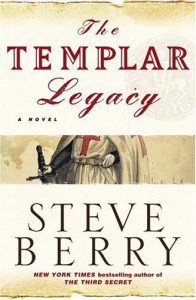 So in my review of The Third Secret I mentioned that I have a love/hate relationship between Steve Berry. However, the introduction of Cotton Malone into the fray helped me along with The Templar Legacy. It doesn't take away from the fact that he's still capitalizing on the religious mystery/Dan Brown bandwagon, though. However, Cotton is a likeable character. The story was interesting. I especially loved Stephanie Nell, Cotton's former boss. She's a tough cookie ... and I like tough cookies.
So in my review of The Third Secret I mentioned that I have a love/hate relationship between Steve Berry. However, the introduction of Cotton Malone into the fray helped me along with The Templar Legacy. It doesn't take away from the fact that he's still capitalizing on the religious mystery/Dan Brown bandwagon, though. However, Cotton is a likeable character. The story was interesting. I especially loved Stephanie Nell, Cotton's former boss. She's a tough cookie ... and I like tough cookies.It's not complicated. It's a page turner. The reveal at the end wasn't totally obvious. Overall, an entertaining read. I especially recommend it for those who like Dan Brown. Sometimes books are just fun. This is one of those books.


